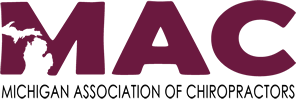09/19/2017
MAC Celebrates October as Spinal Health Care Month! Are You Ready?
Don’t Wait Until October – Start Preparing TODAY!
At the MAC’s request, Governor Snyder has declared October 2017 “Spinal Health Care Month” in Michigan! Spinal Health Care Month is an annual statewide observance stressing the proper function of the nervous system and the correct alignment of the spine. If you start now, there are several ways you can get involved and position your office as the go-to authority in your community for Spinal Health Care Month.
Getting Involved!
If you’re really motivated, you can start preparing for Spinal Health Care Month today. Try some of these ideas for promoting Spinal Health Care Month in your community.
Ideas for Promoting Spinal Health in Your Community
- Prepare the Spinal Health Care Month press release and send it to your local media (see more information below)
- The concept for the American Chiropractic Association’s National Chiropractic Health Care Month is “Back to Basics.” You can tie the National Chiropractic Health Month message into Spinal Health Care Month. Go to www.acatoday.org/nchm for more information.
- Obtain a government proclamation
- Join your local school district wellness/nutrition committee
- Join your local safety council
- Join a local board that organizes local run, bike, or triathlon events
- Speak at local schools on wellness topics
- Promote local growers/farmers in your area
- Donate a portion of your property for a community garden
For action steps to accomplish these goals, contact Tim at the MAC office at (517) 367-2225 or tim@chiromi.com.
Spinal Health Care Month Press Release
This is an excellent opportunity for you to get your name in your local media. Public relations can play a vital role in your practice, and publicity through a newspaper article or radio news story can be the most cost-effective way to communicate with your patients and the public at large. You have an important message to get out: Chiropractic care is the best option to ensure spinal health.
Let your patients know about the importance of Spinal Health Care Month. Many DCs throughout the state hold patient education clinics or other community-related activities throughout October in conjunction with this important month.
MAC members can contact Tim at the MAC central office for a copy of a press release announcing Spinal Health Care Month. Simply put the release on your letterhead and send it to your local media. Tim can be reached by email at tim@chiromi.com or by phone at (517) 367-2225.
Tips for Getting Your Press Release Noticed
The following are some suggestions for getting your Spinal Health Care Month press release printed in your local papers:
- Read your local newspapers and determine who covers health issues. Many smaller papers do not have one single health reporter. In that case, be sure to note the name of the paper’s editor or feature writer.
- Call your newspaper and ask for the mailing address, phone number, fax number, and e-mail address for the reporter or editor you’ve identified.
- Send the press release to that specific reporter or editor BY NAME. Do NOT send it to a generic person or office, such as “Health Editor” or “News Room.” Press releases sent to generic names such as these often are discarded before even being read. If sending an e-mail, be sure to include “Press Release” in the subject line.
- Follow-up with the reporter or editor to whom you sent the release.
- Be prepared to receive a telephone call from the editor or reporter to whom you sent the release. If he or she contacts you regarding the release, be sure to make yourself available should he or she wish to interview you or simply ask you a few questions.
Basic Rules for Dealing with the Media
- Don’t be intimidated. Being interviewed by a reporter can be an intimidating experience even for someone who regularly deals with the media. For someone who rarely does so, it can be downright nerve-wracking. Be sure to go into the interview with a positive attitude – not an adversarial or suspicious one. In the large majority of cases, journalists are sincere and want to be fair and accurate. Questioning the reporter’s motives right off the bat will start you both off on the wrong foot.
- Be honest. It’s true that honesty is the best policy. You can give three answers to a journalist’s question:
- The Complete Answer. Whenever possible, give the complete answer. If you withhold information for no real reason, or you deliberately mislead the journalist, it will be discovered, and the journalist will not trust you again.
- “I don’t know…” If you do not know the answer, it is OK to say so. The journalist will appreciate your honesty and you will protect yourself by not answering a question that is outside your area of expertise. If you do not know the answer, but think that someone at the MAC office might, be sure to suggest that the reporter call us at (517) 367-2225.
- “I can’t answer that, because…” If a question strays into the area of patient confidentiality or sensitive corporate or association information, “no comment” will not do. To reporters, “no comment” is a red flag that says that you might have something to hide. Explain why the question cannot be answered. Your legitimate reason for not answering the question will be appreciated and respected.
- Stick to what you know. As a chiropractor, you are being contacted and interviewed because you have a particular area of expertise that the reporter needs to tap into. Do not stray from your areas of professional competency. You are not required to answer questions that are speculative or seek personal opinions on unrelated subjects. Watch out for questions that begin with “Do you feel…” or “Would you say …”, because your answer will be directly attributed to you.
- Use of “Off the Record.” This is a verbal contract between you and the interviewer that YOU, as the source, must make clear BEFORE you say anything about the topic. You cannot make a statement, and then say that it’s off the record. At that point, it’s too late. You will be quoted. In general you’re better off not trying to go off the record. Just be sure that everything you say to a journalist is something that you would not mind seeing in print.
- Respect reporters as fellow public service professionals. Most journalists are well-trained, hard-working professionals who believe passionately in what they are doing and have a strong desire to serve the public good. Even though some unprofessional actions by reporters have hurt the reputation of journalists in recent years, remember that the large majority of reporters want to present a balanced picture.
- Respect deadlines. Both broadcast and print reporters are laboring under tight deadlines, often merely hours after speaking to their interview subjects. Be sure to find out what the journalist’s deadline is, and be sure that all the information you have promised to provide is available to the journalist well ahead of that deadline. Even though such entities as weekly newspapers or monthly magazines have much more flexible deadlines, still be sure to respect their deadlines, too.
- Avoid jargon. Neither the journalists themselves nor the public at large are likely to be familiar with the terminology you use every day in your practice. The biggest danger in using jargon or terms of art is that you will be misunderstood and that the point you are trying to make will be lost or turned against the profession.
- Remember why they need you. While many reporters cover only one “beat,” such as a health reporter, many other reporters cover stories every day on a variety of topics, often with no more than a rudimentary knowledge of the topic or the briefest guidance from an assignment editor. They know how to ask tough questions and think on their feet, but many of the journalists you speak with will know little or nothing about chiropractic. That means that you have the opportunity to be not only their story source, but also their future reference when stories about the profession come up.
- Be prepared. Be sure to answer the question you want to answer, not necessarily the question that has been asked. Notice how politicians and other prominent personalities often don’t answer a reporter’s questions, but slide off into the area they want to talk about. STAY ON MESSAGE. Do not evade a reporter’s direct question, but make sure to include the points you want to make. It often helps if you can rephrase the question in a way that you can comfortably answer.
- Follow up. After the story is printed or interview is aired, be sure to follow up with the reporter. This will help you build a strong relationship, making it more likely that he or she will contact you in the future when relevant stories come up. If the story was well-written and balanced, thank the reporter and let them know that you are always available as a resource. If the story was inaccurate or incomplete, STAY CALM. First, keep in mind that this could be the result of a copy editor’s errors or edits. Second, it’s possible that the journalist simply misunderstood the information provided. Call the reporter and calmly explain your concerns with the story. Journalists – like most professionals – want to do a good job and get the story straight. Often, a correction or clarification will be run, or the reporter might encourage you to write a letter to the editor. If the story is overwhelmingly positive, with only minor inaccuracies, it is probably best to look the other way and appreciate the favorable coverage you received.
|
Special thanks to the American Chiropractic Association for much of this information.


